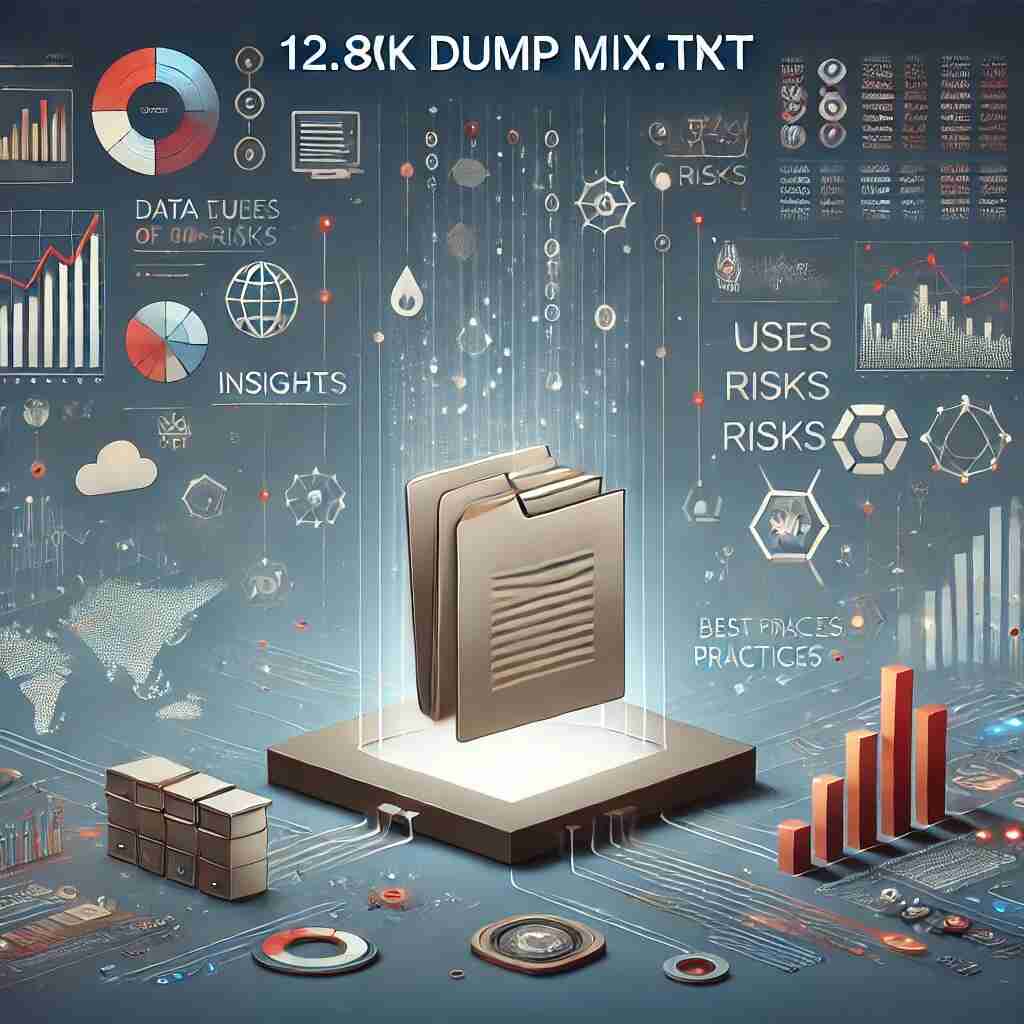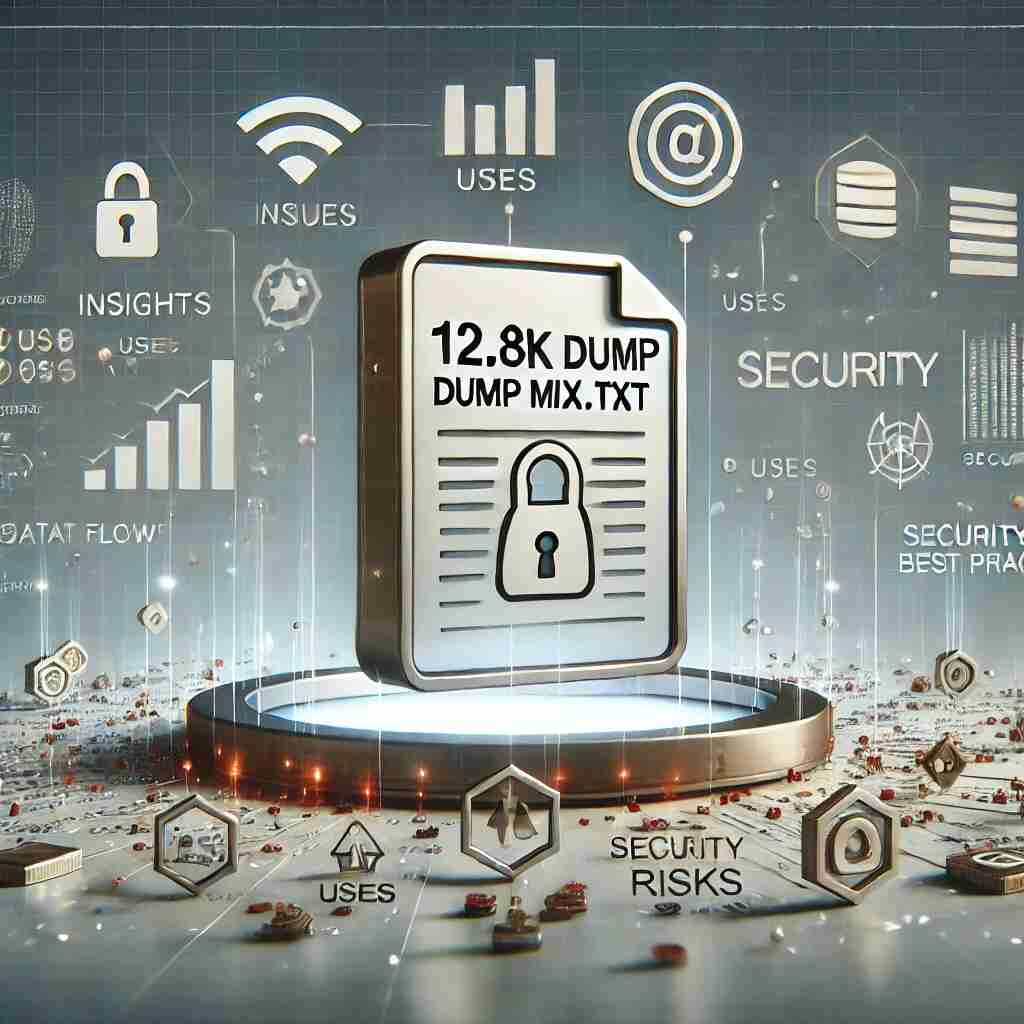Introduction
The digital age has made data one of the most valuable resources. Among the countless types of files shared across the internet, “dump mix” files have gained attention, particularly those containing large data sets like “12.8kk Dump Mix.txt.” These files can contain millions of data points, often utilized for research or security purposes.
In this guide, we’ll explore everything you need to know about the “12.8kk Dump Mix.txt” file, including its contents, applications, best practices, and potential risks associated with its use.
1. Understanding the 12.8kk Dump Mix.txt File
What is a “Dump Mix” File?
A dump mix file is a text file containing significant raw data extracted from various databases or data sources. These files are usually huge, making them challenging to work with but also incredibly resourceful for data analysis.
A dump mix file might contain information like email addresses, passwords, phone numbers, and other data points.
Significance of ‘12.8kk’
In data terminology, ‘12.8kk’ contains approximately 12.8 million entries. Due to their size and potential sensitivity, these high-volume data files require specific management techniques.
Common Contents of 12.8kk Dump Mix.txt
Such files may include various data types, from contact information to transaction records. However, given the sensitive nature, responsible handling of this data is crucial. Typical data types may include:
- Email Addresses: Commonly used for data analysis in cybersecurity.
- User Credentials: Sometimes include hashed or plain-text passwords.
- Location Data: City, country, and sometimes postal codes.
- Other Personally Identifiable Information (PII): Often anonymized but still valuable for analytics.
2. Sources and Acquisition of Dump Files
Where These Files Originate
Data dumps like “12.8kk Dump Mix.txt” can originate from legitimate and illicit sources. Sometimes, they result from data breaches, making them widely accessible online. Others may come from public or research databases.
Legal and Ethical Implications
Handling large data dumps involves navigating a fine line between valuable research and legal boundaries. Accessing, analyzing, and storing data from unverified sources may conflict with data protection regulations such as GDPR or CCPA.
Organizations should prioritize transparency, ensuring all data handling aligns with local and international data protection laws.
3. Analyzing Data in 12.8kk Dump Mix.txt
Tools and Software for Parsing Large Files
Working with large files like 12.8kk Dump Mix.txt requires specific software to parse, filter, and analyze the data efficiently.
Popular tools include:
- Python: With libraries like Pandas and NumPy for data manipulation.
- SQL Databases: To store and manage the data for quicker querying.
- Hadoop and Big Data Tools: These are used in extreme cases when data sizes are unmanageable in regular databases.
Methods for Sorting and Analyzing Data
When analyzing these files, breaking the data into manageable segments is helpful.
Techniques include:
- Data Filtering: Isolate relevant data by specific criteria.
- Data Cleaning: Remove or correct incomplete or corrupted data.
- Data Visualization: Graphical representation aids in identifying patterns.
Key Metrics to Focus On
Specific metrics are more valuable than others, depending on the analysis’s goal.
Examples include:
- Frequency of Entries: Track common elements for pattern detection.
- Keyword Analysis: Useful in textual data for identifying commonly used terms.
- Categorical Grouping: Group data points based on categories like location, age, or interest.
4. Practical Applications of 12.8kk Dump Mix.txt
Research in Cybersecurity
For cybersecurity experts, data dumps are invaluable for identifying patterns in data breaches. Analyzing files like 12.8kk Dump Mix.txt can reveal common security vulnerabilities, helping companies strengthen their systems against similar threats.
Improving Security Protocols
Companies can study data from such dumps to proactively protect their databases. Understanding standard password formats or identifying at-risk user groups could enhance data protection strategies.
Data-Driven Business Decisions
Businesses can ethically utilize data insights from legitimate data sets to improve marketing, customer insights, or user experience. With anonymized data, companies might identify trends like popular product categories, improving their services without compromising privacy.
5. Best Practices for Handling Sensitive Data Dumps
Securing Sensitive Information
When working with large datasets, security is paramount.
Measures to consider include:
- Encryption: Encrypt files both in storage and transit.
- Access Control: Restrict file access to authorized personnel only.
- Regular Audits: Review data storage and usage regularly to maintain compliance.
Data Anonymization
Data anonymization techniques replace sensitive information with pseudonyms or remove identifying details entirely, thus allowing researchers to analyze trends without compromising individual privacy.
Complying with Privacy Regulations
Regulations like GDPR mandate responsible handling of personal data. Complying with such laws helps organizations avoid penalties and maintain trust with users. Ensuring data is anonymized and used only for legitimate purposes is critical.

6. Potential Risks of Using Dump Files
Security Risks
Unprotected data can lead to significant security vulnerabilities. Unauthorized access to sensitive information can lead to breaches, affecting individuals and companies.
Ethical and Legal Risks
Data dumps are often obtained through security breaches, leading to ethical concerns. Illegally obtained data may have legal repercussions for organizations or individuals who access it without proper authorization.
Reputational Risks for Businesses
Using data from dumps irresponsibly or without transparency can harm an organization’s reputation, particularly if user data is compromised. For instance, associating with unethically sourced data could lead to public distrust and damage brand image.
Conclusion
The 12.8kk Dump Mix.txt file represents a massive amount of data, offering both opportunities and challenges. By following best practices for data handling, organizations can use this data responsibly, driving positive outcomes without risking legal and ethical consequences. Proper analysis of such data requires the right tools, responsible management, and a commitment to user privacy and security.
Remember, while data is a powerful tool, it must be used wisely, respecting the boundaries of legality and ethics.
Frequently Asked Questions (FAQs)
What is a ‘12.8kk Dump Mix.txt’ file?
It’s a text file containing around 12.8 million entries of raw data, often used in cybersecurity and data analysis.
Is it legal to analyze dump files?
It depends on the file’s source and purpose. Comply with data protection laws and ethical standards.
What tools can handle large .txt data dumps?
Python, Pandas, SQL databases, and Hadoop are famous for managing and analyzing extensive data files.
Why is data anonymization crucial in dump analysis?
Anonymization protects individual privacy, helping organizations comply with regulations like GDPR.
Can I use data dumps for business insights?
Yes, provided the data is ethically sourced and anonymized, businesses can gain valuable insights without compromising privacy.


